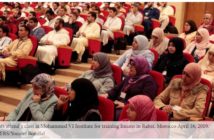
Every time the issue of relationship between the two countries is brought up, there is always a historical fact that characterizes this powerful relation: Morocco was the first country to recognize the independence of the United States.
Since then, the two countries have always deployed tremendous efforts to consolidate their already excellent bilateral relations. This strategic historical partnership has undoubtedly given a fresh impetus to the two countries and has opened up vast promising prospects.
In late 1777, Washington’s army suffered a major defeat against the British and were forced to surrender the major city of Philadelphia to the enemy. Washington’s worst day during the Revolutionary War came as his men were encamped at Valley Forge, Pennsylvania, on December 19 of that year. Washington stressed in a letter to his friend George Clinton of “the dreadful situation … for want of provisions, and the miserable prospects before us, with respect to futurity.” Just as his army reached its most desperate state, Washington learned of the news of a Muslim man named Sultain Sidi Muhammad ben Abdallah of Morocco, who showed interest in helping the Americans in their fight against the British Empire.
Once informed of Washington’s conflict, Sultan MohammedA Ben Abdallah assisted Washington by listing the newly independent United States of America as a country whose trading ships would be welcomed in the ports of Morocco, a move which offered the potential for supplies to be shipped to Washington’s army. In 1778, shortly after his initial effort to help Washington, Abdallah appointed Etienne d’Audibert Caille, a French merchant, to serve as an ambassador to unrepresented countries such as the United States of America. These early diplomatic relations between the United States of America and Morocco culminated in the ratification of the Treaty of Marrakech in 1786, which remains to this day the longest standing foreign relations treaty in American history.
Congress found the Treaty of Marrakech so satisfactory that is passed a note of thanks to Thomas Barclay, a diplomat at the American consulate in Paris, France, for his effort in finalizing the agreements. In reflecting on his experience while negotiating with Moroccans, Barclay wrote that Abdallah “acted in a manner most gracious … and I really believe the Americans possess as much of his respect and regards as does any Christian nation whatsoever.” Barclay said that Abdallah was a “just man, according to this idea of justice, of great personal courage, liberal to a degree, a lover of his people, [and] stern.”
In effect, the Treaty of Marrakech demonstrates that Washington and other members of Congress had no reservations with trusting or entering into a friendship with Muslims. The treaty is also evidence of how Washington and other early Americans judged foreign leaders not on the basis of their religious beliefs, but on the sincerity and strength of their character and conduct.
Washington’s appreciation for Mohammed Ben Abdallah was reaffirmed in a personal letter, dated December 1, 1789, which he sent directly to king’s court. In addition to ensuring America’s commitment to maintaining “peace and friendship” with Morocco, Washington stated that Americans would “gradually become useful to [their] friends.” Washington told the Moroccan King Abdallah so long as he was President of the Untied States of America, he would “not cease to promote every Measure that may conduct to the Friendship and Harmony, which so happily subsist between your Empire and [Americans].”
After the death of Sultan Mohammed Ben Abdallah in 1790, the Treaty of Marrakech was validated by Morocco’s new sultan, Moulay Suliman, who made it clear in a letter to the American consulate at Gibraltar that “we are at peace, tranquility and friendship with you in the same manner as you were with our father who is in glory.” Suliman added: “the Americans, I find, are the Christian nation my father most esteemed … I am the same with them, as my father and I trust they will be so with me … With good relations thus reaffirmed.” This official correspondence between American and Moroccan officials shows how both parties regarded each others’ faith with the utmost respect.Solid, longstanding relations between the United states and Morocco. Throughout history, leaders of both countries have always been keen to continue working and coordinating with each other to further develop and expand their bilateral ties.
Throughout history, Morocco has always reiterated its keen desire to pursue consultation and coordination with the United States of America with a view to developing mechanisms to make sure their promising partnership leads to concrete projects that benefit key sectors in respective countries and serve as models of solidarity and complementarity in the region.
At the UN, the two countries’ views have always converged on key international issues to promote peace and stability around the world. Morocco has always offered wise advice and even concrete actions to boost the peace process between Israelis and Palestinians in total coordination with the American administration. This has never discouraged Morocco to offer candid and honest views to put the peace process back on the negotiation table. A position that has gained Morocco a lot of credibility and respect in the eyes of the American leadership.
Since King Mohammed VI acceded to the throne on 23 July 1999, all his efforts of in-depth reform in Morocco were highly appreciated and supported by the American leadership.
Letters from former President Bush and current President Obama praising Morocco’s commitment to democracy, rule of law and sustainable development including Morocco’s continuous endeavors to set up a complementary, integrated Maghreb Union to promote a regional environment in which the people concerned can enjoy security, prosperity and stability.
Morocco shares US earnest ambition regarding the achievement of sustainable development in Africa. Morocco has always stood by American side to uphold the ideals of freedom, justice, equality and dignity, to foster good governance and shared progress, to promote the lofty human values of tolerance and intercultural, inter-faith coexistence and to reject all forms of violence, extremism and insularity.
Morocco pledged to do whatever it can to contribute to the emergence of a better, safer, more peaceful and more equitable world which is committed to upholding the principles of solidarity and to international legitimacy.
This “parfaite entente” between the two countries resulted into the creation of the Strategic Dialogue, recognition of than a decade of peaceful reforms and stability under the leadership of King Mohammed VI. The two countries signed the Strategic Dialogue, which will not be affected by changes in administration, leadership or personnel, officially begins and builds on bilateral advances already achieved, including the Morocco-US Free Trade Agreement, the Millennium Challenge Compact, and Morocco’s designation as a major non-Nato ally.
It is high time now to give a new impetus to the private sector, NGOs, think tanks, universities…from both countries to implement many of the agreements and accords reached between the two countries. Both Moroccans and Americans should now accelerate their initiatives and projects in different fields to give a meaning to excellent political relations between the two countries. An economic, cultural, educational road map should be elaborated to open doors for potential projects from both sides.
If Morocco was the first country to recognize the independence of the United States, it should now be the first country to develop a strong win-win partnership with the United States.






